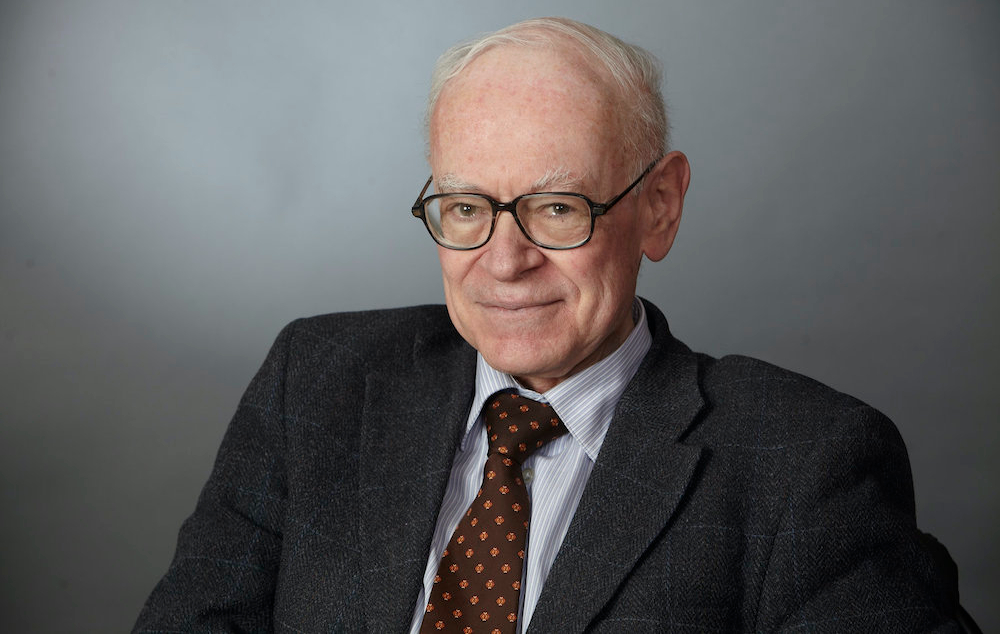The University of Alberta is mourning the passing of Bohdan Medwidsky, a longtime professor, philanthropist and community leader, and the driving force behind the U of A becoming the home away from home for Edmonton’s Ukrainian community and a powerhouse in Ukrainian studies. He was 84.
Medwidsky was born in Stanislaviv (now Ivano-Frankivsk in Western Ukraine) in September 1936. He was sent to Switzerland as an infant because of health issues and ended up being stranded in Switzerland for the duration of the Second World War.
He wasn’t reunited with his family—including a brother, Wolodymyr, whom he had never met—until 1948 in Vienna, Austria, as scores fled communist Ukraine after the war. It was there, in the Lexenfeld displaced persons camp, where Medwidsky relearned Ukrainian and developed a strong personal identity as a Ukrainian patriot.
His family was sponsored to come to Canada and settled into the large Ukrainian immigrant community in Toronto.
A graduate of the University of Ottawa with a BA in 1963 and an MA in 1966, Medwidsky received his PhD from the University of Toronto in 1977.
In 1971, Medwidsky made his way west from Ontario, where he held teaching positions at both the U of T and Carleton.
As a professor in the Department of Slavic and Eastern European Studies, Medwidsky saw the demand for Ukrainian folklore instruction. The large population of Ukrainian families in the Edmonton area made the U of A an ideal location for these folklore classes.
Through his determination and dedication, he created the first Ukrainian folklore class in 1977.
The Kule Centre for Ukrainian and Canadian Folklore was founded in 2001. The archives that now bear his name, the Bohdan Medwidsky Ukrainian Folklore Archives, have become the largest North American repository of Ukrainian and Canadian-Ukrainian folklore materials.
The archives house unique collections of fieldwork materials that document traditional cultural expressions and knowledge, ethnographic documents and artifacts, and extensive library holdings.
As a result of Medwidsky’s work, 50 graduate degrees specializing in Ukrainian folklore have been granted. He is also responsible for an unprecedented level of research in Ukrainian folklore, customs, oral lore, material culture, music and dance, and initiated many community-based projects promoting Ukrainian culture that have had a direct benefit to museums, dance ensembles, musical groups and community organizations.
Medwidsky also worked as a dedicated volunteer and participant for Ukrainian organizations at the municipal, provincial and national levels. He contributed many of his own donations to fundraising campaigns of a multitude of groups. He also served in leadership positions of the Ukrainian Canadian Congress – Alberta, Ukrainian Village Board, Friends of the Ukrainian Village Society, Brotherhood of Ukrainian Catholics, Alberta Ukrainian Pioneers Association, Friends of the Ukrainian Folklore Centre, Ukrainian Catholic Council and many others.
In 2002, Medwidsky retired and became professor emeritus, but he never strayed too far from the university. Until the pandemic, he was quite active with the Kule Folklore Centre, coming into the office daily, working on ideas for the Friends of the Ukrainian Folklore Centre Society, on Ukrainian bilingual education and fundraising, and for the Ukrainian Canadian community, the U of A and Albertans in general.
In 2009, Medwidsky received the award of Orders of Merit III Grade from then President of Ukraine, Viktor Yushchenko.
Natalie Kononenko, U of A Kule Chair in Ukrainian Ethnography emerita, said it was easy to recognize just how sincere and dedicated her friend and colleague was.
“He was enormously persuasive when it came to attracting donors to support the Ukrainian folklore program and the Kule Folklore Centre. He could probably talk just about anyone into supporting his goals,” said Kononenko.
“He put his goals of promoting his causes ahead of promoting himself. He was someone not only dedicated to a cause, but willing to put his all into achieving it.”
Andriy Nahachewsky, Huculak Chair emeritus and former director of the Kule Centre for Ukrainian and Canadian Folklore, described Medwidsky as being steadfast, patient and above all persevering, deriving great pleasure from overcoming obstacles to achieve his goals.
“Though he did not typically like to speak about himself, he sometimes noted ‘я будую Україну’—’I am building Ukraine [in my own way, and here in Canada].’ This is profoundly true, and his impact will continue on and on,” said Nahachewsky.
—With notes from Natalie Kononenko
